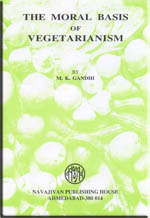
P.O. SEVAGRAM, DIST.WARDHA 442102, MS, INDIA. Phone: 91-7152-284753
FOUNDED BY MAHATMA GANDHI IN 1936
Towards New Education

THE MORAL BASIS OF VEGETARIANISM
Written by :M. K. Gandhi
Table of Contents
- Food Values
- Unfired Food
- Vital Need for Research
- Vegetarianism
- Not An End in Itself
- The Moral Basis of Vegetarianism
- Our Daily Diet
- Minimum Diet
About This Book
Written by : M. K. Gandhi
First Edition :10,000 copies, 1959
I.S.B.N :81-7229-122-1
Printed and Published by : Jitendra T. Desai
Navajivan Mudranalaya,
Ahmedabad - 380 014,
India.
© Navajivan Trust, 1959
Download
Chapter-4: Vegetarianism
A correspondent is born in a meat-eating family. He has successfully resisted the pressure from his parents to return to the flesh-pot. “But”, he says, “in a book I have before me, I read the opinion of swami Vivekanand on the subject and feel a good deal shaken in my belief. The Swami holds that for Indians in their present state flesh diet is a necessity and he advises his friends to eat flesh freely. He even goes so far as to say, “if you incur any sin thereby throw it upon me; I will bear it.’ I am now fix whether to eat flesh or not.”
This blind worship of authority is a sign of weakness of mind. If the correspondent has such a deep seated conviction that flesh eating is not right, why should he be moved by the opinion to the contrary of the whole world? One needs to be slow to form convictions, but once formed they must be defended against the heaviest odds.
As for the opinion of the great Swami, I have not seen actual writing but I fear the correspondent has correctly quoted him. My opinion is well known. I do not regard flesh-food as necessary for us at any stage and under any clime in which it is possible for human beings ordinarily to live. I hold flesh-food to be unsuited to our species. We err in copying the lower animal world if we are superior to it. Experience teaches that animal food is unsuited to those who would curb their passions.
But it is wrong to over estimate the importance of food in the formation of character or in subjugating the flesh. Diet is a powerful factor not to be neglected. But to sum up all religion in terms of diet, as is often done in India, is as wrong as it is to disregard all restraint in regard to diet and to give full reins to one’s appetite. Vegetarianism lightly given up. It is necessary, therefore, to correct the error that vegetarianism has made us weak in mind or body or passive or inert in action. The greatest Hindu they have invariably been vegetarians. Who could show greater activity than say Shankara or Dayanand in their times?
But my correspondent must not accept me as his authority. The choice of one’s diet is not a thing to be based on faith. It is a matter for every one to reason out for himself. There has grown up especially in the West an amount of literature on vegetarianism which any seeker after truth may study with profit. Many eminent medical men have contributed to this literature. Here, in India, we have not needed any encouragement for vegetarianism. For it has been hitherto accepted as the most desirable and the most respectable thing. Those, however, who like the correspondent towards vegetarianism in the West.
Young India, 7-10-1926
One should eat not in order to please the palate but just to keep the body going. When each organ of sense sub serves the body and through the body the soul, its special relish disappears, and then alone does it begin to function in the way nature intended it to do.
Any number of experiments is too small and no sacrifice is too great for attaining this symphony with nature. But unfortunately the current is nowadays flowing strongly in the opposite direction. We are not ashamed to sacrifice a multitude of other lives in decorating the perishable body and trying to prolong its existence for a few fleeting moments with the result that we kill ourselves, we give rise to a hundred new ones; in trying to enjoy the pleasures of sense, we lose in the end even our capacity for enjoyment. All this is passing before our very eyes, but there are none so blind as those who will not see.
Autobiography, p. 237, Edn. 1958
There is a great deal of truth in the saying that man becomes what he eats. The grosser the food the food the grosser the body.
Harijan, 5-8-1933
I do feel that spiritual progress does demand at some stage that we should cease to kill our fellow creatures for the satisfaction of our bodily wants. The beautiful lines of Goldsmith occurs to me as I tell you of my vegetarian fad:
No flocks that range the valley free
To slaughter I condemn;
Taught by the Power that pities me
I learn to pity them
India’s Case for Swaraj, pp. 402, Edn. 1932